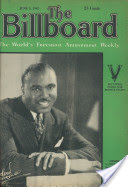 From the MCRFB radio scrapbook: 1943
From the MCRFB radio scrapbook: 1943
‘MANPOWER PAINS GROW’
Detroit Swings To “Ingenious Substitutes” For Solutions In Wartime WWJ, WJBK, CKLW
 DETROIT (May 29) — Despite the fact that the Motor City usually figures as the No. 1 manpower headache in the country, local radio stations are not too badly off in connection with announcing, sales and technical personnel. Several have resorted to ingenious substitutes or policies to meet the situation.
DETROIT (May 29) — Despite the fact that the Motor City usually figures as the No. 1 manpower headache in the country, local radio stations are not too badly off in connection with announcing, sales and technical personnel. Several have resorted to ingenious substitutes or policies to meet the situation.
In the background is the fact that Detroit attracts labor in all fields, and this goes for radio stations as well, by its glamour as an alleged high-standard learning center. There has never been a surplus of station jobs available, jobs so far has not exceeded demand.

Generally typical is the set-up at WWJ, NBC station, and the only one to turn to female announcers — they now have two femme gabbers and one girl newscaster. Reaction from the public has been favorable, according to Edwin K. Wheeler, assistant manager. However, the station is not committed to femmes unless they have to — they hired two more male announcers in the past two weeks. It is figured that the leaving of ladies on the staff will help if and when the femmes take over all the way. This may happen in a few months with the drafts of fathers, into which class most of the announcers now fall.
Fertile Sources Closed
The commercial staff of WWJ has not been touched by the draft yet, but has only three men, since most of the selling is done by the net anyway. They expect to lose two of the three, by August 1, and will probably get along with the remaining salesmen.
On the engineering side, WWJ has been able to meet the loss of men without difficulty so far, by drawing in skilled men from other fields. One source, now closed, was the smallest station, but with WMC rulings on job freezes particularly effective in this “essential” industry and especially in the Detroit labor region, this avenue appears about closed without extraordinary special exemptions in an emergency case.
WWJ got one good technical man who was formerly a radio serviceman, despite the shortage of serviceman in this city. Another replacement was formerly a radio “ham” operating his own station. These sources are about exhausted now.
WJBK, typical of the smaller stations, has lost two salesmen and three announcers, with another set to go in a week. They are having their salesmen double-up, and are getting by in the commercial department. So far, enough new announcers have been forthcoming to meet the situation, but the station is using five woman as monitors on foreign-language programs, covering 13 different languages.
Draft Free Breaks
The technical staff has not been touched at WJBK. Although there has been no deliberate policy, N. W. Hopkins commented that “We never figured that a handicap should be discriminated against if a man has the technical ability.” The result is a large proportion of F-4 men and the willingness now to employ any more they can get. In addition, WJBK has some technical men with pre-Pearl Harbor dependents, who has so far been draft exempt.
At CKLW, the situation is peculiar in that the station has studios in Detroit, but has its transmitter and other studios in Windsor, Ontario, and comes under Canadian regulations. The technical staff has been little affected as yet, according to Richard E. Jones, sales promotions manager, who said that “Canadian regulations have evidently given considerable thought to the requirements of the broadcast industry. It looks as though they were a little more liberal in granting deferments where an industry is of public importance.”
The station has lost two salesmen, four engineers and four announcers. The sales situation is being met by older men, and Jones commented that “We will probably have to expect a trend toward the employment of older men than has been usual in radio.”
Public Against Gals
On announcers, sentiment at CKLW appears to be rather against the use of women announcers. This is based on a study of public reactions to the use of females at other stations, Jones said, though it may, in part, be due to unfamiliarity. CKLW, meanwhile, will try to get by with present announcers doubling up on duties.
Up until the past few weeks, local stations were able to attract staffmen from other cities, both small and large, with good scales of pay in effect here. A new type of difficulty recently became critical when one station lost an announcer from Chicago who preferred to go back to free-lancing there, when he was unable to get rooms to house his wife and family in Detroit after six months of trying. END
(Information and news source: Billboard; June 5, 1943).
![]()

